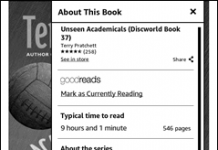![image31[1] image31[1]](http://www.teleread.com/wp-content/uploads/2010/01/image311_thumb.png) Internet industry research firm TBI Research estimates that Amazon.com currently has 90% of the entire e-book market. (Last month, I covered TBI’s claim that Amazon is losing money on every title from major publishers sold at $9.99 or less.)
Internet industry research firm TBI Research estimates that Amazon.com currently has 90% of the entire e-book market. (Last month, I covered TBI’s claim that Amazon is losing money on every title from major publishers sold at $9.99 or less.)
This article makes a number of interesting claims and suppositions. It suggests that the Kindle format could become “the standard e-book format,” turning competitors into “the equivalent of generic MP3 players competing against iTunes,” but estimates that at the moment e-books still make up less than half a percent of Amazon’s total revenues.
Here is one especially interesting passage (emphasis theirs):
We have heard from various sources that Amazon is not opposed to backing away from its DRM policy since it doesn’t want to annoy consumers. However, for now, consumers appear oblivious to the DRM restrictions since they are all buying e-books on Amazon and reading them on Kindles. So for now Amazon shouldn’t feel any pressure to change anything.
TBI also claims to be hearing from publishers that if Amazon is able to hold onto as much as 50-70% of the e-book market despite competition from market rivals, the publishers would be forced to cave on wholesale price points within two years.
Of course, much of this is based on supposition and guess, as Amazon has been notorious about keeping any actual figures close to its chest. And Amazon still does not sell e-books in most international regions (though it probably will not be long before they expand).
But if TBI is even close to the mark, it is somewhat disturbing to consider the prospect of Amazon becoming the “iTunes of e-books”, especially in light of the apparent lack of concern about DRM of Amazon’s customers.
































I guess this study applies to the States. Also, it only applies to some publishers, probably some of the big ones.
Kindle probably has the most market share in global terms, but +90% feels way too much for me.
This is like saying that the iPhone owns the smartphone market. That may be true in the States, but in Europe Nokia (for example) is very powerful. Probably something similar happens in Asia.
I don’t see how they get to this 90% figure. Companies like Fictionwise and Diesel have been around for years selling ebooks and presumably making enough to stay in business. If Amazon have 90% of the market then that would seem to indicate that the market has expanded 10 fold?
Perhaps they mean Amazon sells 90% of all ebooks on the Kindle platform?
Are we all still driving Ford’s because they came out with the Model T?
90%
Maybe…
If 90% refers to DRM’ed ebooks from the BPHs.
And obviously the report only refers to the US; Kindle hasn’t been around long enough outside the US for anybody to have any data.
The customers don’t care about DRM? Of course not! If they cared they wouldn’t be buying off the Amazon bookstore and they wouldn’t be buying Kindle.
Nothing new in any of that.
What is new is the (belated) realization by the BPHs that their splintered counter to Amazon’s ebookstore is no counter. Just as Playsforsure was no counter to iTunes. (It’s not the hardware that sells ebooks; it’s not the format or the crapscans. It’s the price and availability! Idiot BPHs! )
Anyway…
Two years to “armaggeddon”, huh?
2012. 🙂
Amazon can keep it up at least that long just on mindshare alone.
Not sure the conclusion *is* valid but if the BPHs buy into it, it means they’ll now start looking to a different “solution” to their little 2012 problem.
Maybe Apple. (heh!)
Maybe Microsoft.
Maybe Blio.
A whole lotta scrambling coming up.
Gonna be fun to watch.
Hardware-backed eReaders that actually register with customers are a fairly recent thing. Amazon’s market share will decrease, just as iPhone has with the release of Droid and another Android-based products. Amazon has owned name recognition and content distribution for a few years. Now, the scene is expanding and things will change.
I have to agree with the summation that Amazon has no incentive to change DRM policy when their consumers obviously don’t care about the topic. The non-Kindle consumers (if the market share can be vastly reduced) will be the ones to alter that policy.
I wouldn’t be surprise to find that for the US, at least, this stat is pretty accurate.
But even if it’s not, all it would take to become accurate would be for Amazon to open its store to other ebook readers. I go to Amazon to read the reviews & sample ebooks before making my purchases for my Sony Reader somewhere else.
Yeah, I use Inkmesh to comparison shop the prices. But if I could “one-click” download an ebook to my computer, or my Reader when attached to my computer, I’d buy at Amazon, & even pay a little, more just for the ease of it.
In the US, I can’t really see much changing from Amazon vs everyone else (with Amazon winning hands down). It is only very recently that everyone except Amazon got behind Adobe ePub. Even there, B&N is muddying the waters by selling passworded ePubs, so there isn’t yet a single ePub market. B&N has some chance of becoming a major player, but not in Amazon’s league. Don’t forget that Skiff and Google are probably going to add more incompatible ebook formats and DRM.
The fact that the DRM on Kindle for PC has been circumvented means that now almost everyone can buy from Amazon, even if they don’t have a Kindle. This just increases Amazon’s dominance.
i have a kindle, and i care about drm. but linking amazon’s name with drm is a bit misleading, don’t you think? do people think the other books they’re buying aren’t drm ‘protected’?
my biggest beef isn’t with drm — although i hate it deeply. my biggest beef is with device-specificity among drm’d books; and it appears to be a fact that only amazon and barnes & noble seem to limit which device a book may be read on. (if i’m wrong, i know someone will set me straight.)
i would love to just be in a giant snit at amazon, and insist that i won’t buy their device until they allow my to buy books from other places, or read amazon e-books on a sony. but if i do that, they wouldn’t believe me; they’d think i was being a troll. i’d been waiting 30 years for this technology; and unfortunately i am mortal. i didn’t want to miss out.
*so i’m careful to buy only expendable books that i might re-read, or that are really long*. eventually i will let amazon know that. that way they will see that i am their customer, and that i like the device; but that i might give them more money if i didn’t have to be so careful about what i buy.
the thing is, these devices are more economical than more bookcases, take up far less space, and hold more books than the average physical bookcase. i’m not taking off the table the possibility that i might buy a sony one day, and have two readers; but it seems kind of stupid to have to do that — and i’ll let amazon know. think of all the books i could buy from amazon with all that sony reader money…
two more thoughts on why kindle owners aren’t screaming loudly about drm: 1. most of us are on our first kindle, and have therefore experienced no problems with forward-compatibility. (subscription backissues *do not migrate*.); and 2. one can read just about any non-drm protected book on a kindle, from project gutenberg or many other free sites. so kindle owners are finally reading those old classics; and there are more of those *actually worth reading* than there are days left in the average person’s life expectancy.
in other words, a lot of kindle owners are too busy actually reading books to care right now.
The article is pretty clear: it says that “Several publishers and distributors tell us that Amazon is currently selling upwards of 90% of all e-books sold.” (Boldface is theirs.)
Not all e-books in the USA. Not all DRMed e-books. Not even “all e-books those publishers and distributors carry” or it would have added that qualifier. But all e-books that are sold.
As Beth says, hardware readers like the Kindle that bring e-books out of the purview of a handful of geeks and into the hands of the general public are very new and recent, and the most popular one is Amazon’s. All the other e-book sales in the world, even those in other countries, are probably just a drop in the bucket next to all those numbers Amazon is moving.
It may “feel way too much.” And as I said, it is based at least in part on supposition (TBI’s or those publishers and distributors’) because Amazon is tight-lipped about its sales figures. But between a blog reader’s intuition and an industry research firm’s and businesses’ supposition? I know which one I’m going to trust as closer to the mark.
If you go to the Kindle store and look at the list of best selling Kindle books you will quickly notice that the vast majority of the ones at the top of the list are “selling” for $0.00. These are either public domain titles or titles that are given away as a promotion, usually because they are the first book in a series.
About once a week I go the Kindle store to see what is free. Last week I grabbed four romance titles that I would never read but thought my wife might like to try someday. When ebooks are free I figure I might as well add them to my library. I’m sure tons of other Kindle owners feel the same way.
When you select one of these titles costing $0.00 Amazon runs you through the exact same sales routine that they do for an ebook that actually has a cost. You even get email confirming your “purchase”.
So I assume that Amazon is playing a clever little shell game here and treating all free books that people download as sales. So it’s pretty much impossible to know how many real sales they are making for real money.
The people at TBI might understand technology, but they really don’t understand publishing.
Publishing has a very small margin of profit, and the conglomerate publishers can’t really increase that margin or decrease the cost of producing books any more than they already have.
If Amazon keeps shoving the price of ebooks down while keeping a majority of the profit for themselves, the conglomerate publishers will finally realize that the tail has been wagging the dog, and Kindle needs their content to stay alive. The publishers will start using the power they have for a more equitable split of profits and a price that allows them reasonable profit.
At the same time, the name authors who don’t have to include ebook rights in with the paper rights like other authors will look at the pittance they are making from ebook sales after Amazon and the publisher has taken their cut, and those authors will decide to sell their books through more profitable venues.
If the mass exodus of the name authors doesn’t force the publishers and Amazon to get their acts together, nothing will.
Binko Barnes nails it in the comment above. How else do you think Amazon put together that figure of selling 48 e-books for every 100 print books where both are available? Easy, drown out the cases where e-books cost money by counting the thousands of free downloads of books where no one buys the print version.